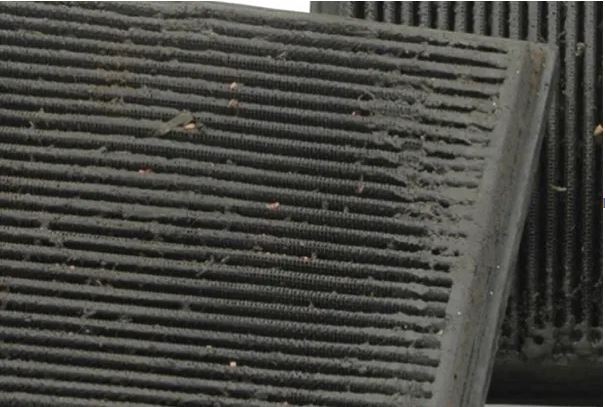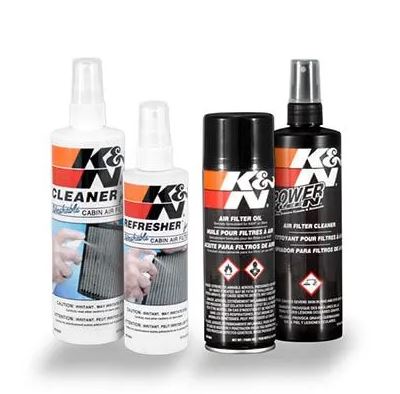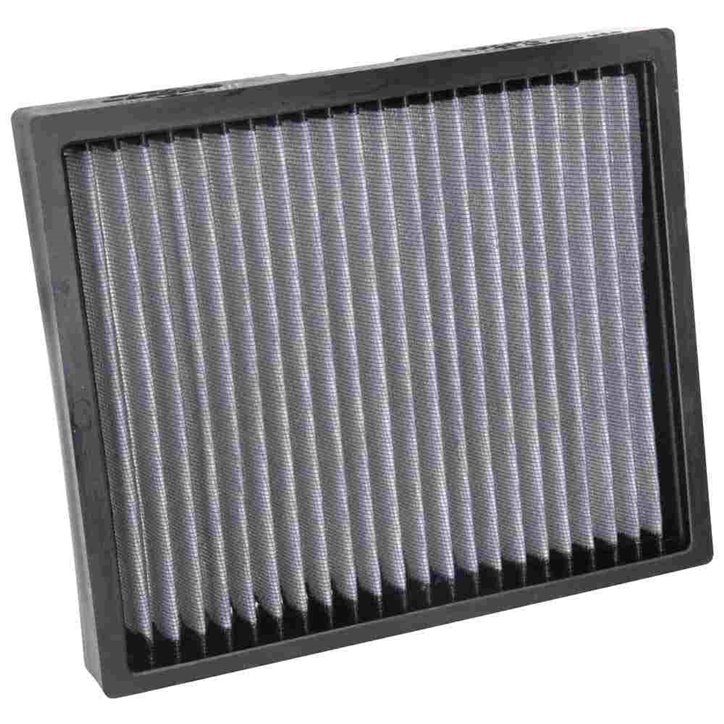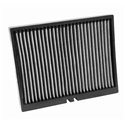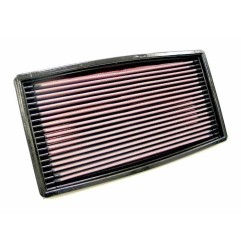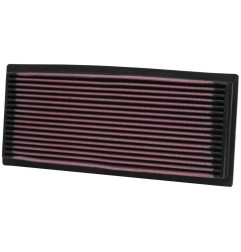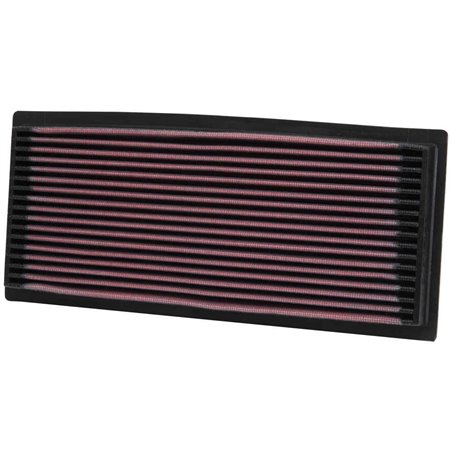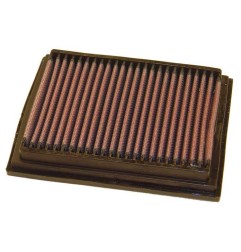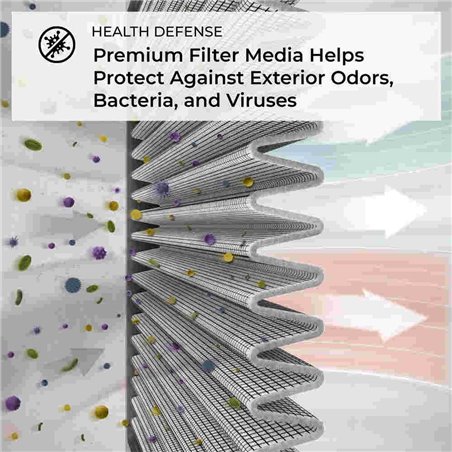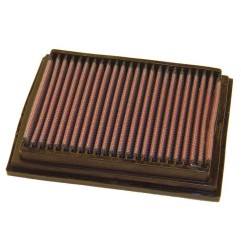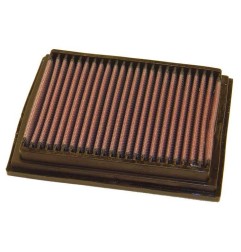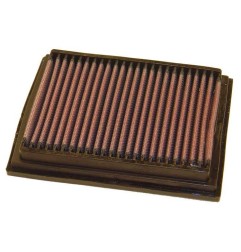Tu tienda de recambios de competición.
Any system can increase the air flow in an engine's intake; the trick is to make that air flow more safely. K&N has designed air filters that achieve an optimal combination of high air flow, high filtration efficiency, durability and dust-holding capacity.
K&N air filters have been tested both at the manufacturer's premises and by independent laboratories, achieving ISO5011 certification.
K&N's goal is to design air filters with the maximum achievable airflow, while providing engine protection. K&N air filters are composed of 4 or 6 layers of cotton, placed between two aluminum wire meshes coated by epoxy resins. The cotton is treated with a special oil formula, which increases the tackiness along the microscopic filaments of the cotton.
Most air filter manufacturers cannot guarantee the same balance of airflow and filtration over the life of the filter, without having to sacrifice one for the other. With a K&N filter, there is no sacrifice.
CHARACTERISTICS:
|
K&N Filter Types
The brand offers you several types of filters depending on your needs:
- Replacement Filters : K&M High-Flow Air Filters™ products deliver up to 50% more airflow than disposable filters, while providing industry-leading contaminant protection through the use of advanced filtration materials. You can find them as a main air filter and a cabin filter.
- Oil Filters: K&N high-performance oil filters are designed to deliver high flow rates and exceptional protection from contaminants, allowing you to keep on the road and stay out of the shop.
- Intake Kits : A K&N air intake system doesn't just promise you more horsepower and torque, it guarantees it. K&N air intake systems are designed to direct airflow more efficiently than factory intake systems, increasing the efficiency of your engine's combustion process.
  |
 |
 |
Frequently Asked Questions about K&N Filters
What is an engine air filter?
Engine air filters act as a layer of protection against debris and particles that could damage a vehicle's engine.
Basically, engine air filters prevent anything that enters a vehicle's intake system from entering the engine's cylinders. Common contaminants include bugs, dirt, dust, pollen, and more.
How does an engine air filter work?
The heart of a vehicle is the engine. It is vital to the overall health of the vehicle, and to function properly, engines need a constant flow of clean air. If the air is not filtered before entering the engine, particles of any size could clog the engine and cause serious damage.
Engine air filters solve this problem by trapping airborne contaminants and ensuring a constant airflow. The typical pleated design of an air filter increases the surface area for contaminant capture, while the filter materials contribute to the effectiveness of microparticle capture.
What are the differences between types of engine air filters?
Paper air filters are typically the most cost-effective type of filtration product. Given the durability of the materials, paper air filters are intended for single use and require periodic replacement.
K&N washable filters can be reused for long-term use. They can also come in two forms: oiled or non-oiled. Although they are typically more expensive than paper filtration products up front, reusable filters often offer cost savings in the long run.
How does an engine air filter improve performance?
Engine air filters play an important role in vehicle performance. If an engine air filter is dirty or missing, harmful debris can enter the engine cylinders and cause serious engine damage. In addition, a high-quality filter can ensure that a powerful supply of clean air reaches the engine, thereby improving performance.
How often should I change the engine air filter?
Average driving conditions warrant an air filter replacement every 12-15,000 miles, which is about once a year (depending on driving frequency and location). For drivers in large cities or high-traffic areas, an engine air filter may need to be replaced sooner, possibly around 6,000 miles. Other driving conditions can also affect the lifespan of an engine air filter, such as terrain and environmental factors. If you live in a particularly dusty environment, you may want to consider changing or servicing your filter more frequently.
Not all engine air filters require replacement. K&N® high-flow air filters are designed to last the life of a vehicle and are backed by a million-mile limited warranty. With a simple cleaning every 50,000 miles (under normal highway conditions), they will perform virtually like new time and time again.
How do I know if the engine air filter needs to be changed?
Although engine air filter replacement is typically determined by mileage, there are some warning signs that can indicate when a dirty filter needs to be washed or replaced.

Reduced fuel economy is often related to the engine air filter because reduced airflow puts stress on the engine. If you find yourself refueling more often than usual, the problem could be a dirty engine air filter.
Excessive exhaust smoke is another possible sign that an engine air filter may need to be replaced.
A reduction in horsepower indicates a possible problem with engine airflow, which is directly related to the cleanliness of the air filter. If a car does not accelerate normally, the cause may be a clogged air filter.
How do I change the engine air filter?
Replacing or renewing your engine's air filter is usually simple. Here's how to do it:
- Locate the engine air filter, which is usually located under the hood near the engine. Sometimes the box can be opened without tools, while other air box designs may require simple hand tools to open.
- Remove the dirty air filter and observe how it is installed. If you are replacing a reusable air filter, clean the filter before reinstalling it.
- Install the clean filter by matching the direction and location. That's it!
How can I take my engine air filter to the next level?
K&N cold air intakes combine with K&N high-flow air filters to improve engine performance. A cold air intake system keeps the air flowing into the engine cooler and more oxygen-dense, resulting in more efficient combustion, and in turn, increased horsepower, torque, and overall performance. K&N air intakes are also designed to improve engine sound, giving it a satisfying roar when accelerating.

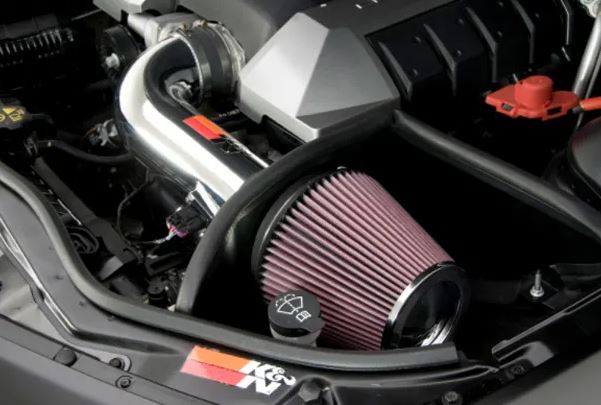
How do you clean a K&N filter?
Nothing easier than disassembling, using K&N cleaning products and reinstalling.
42726 products


